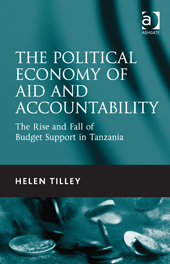The Political Economy of Aid and Accountability: The Rise and Fall of Budget Support in Tanzania

Accountability is a concept many refer to without much attention to its meaning. In The Political Economy of Aid and Accountability, Helen Tilley, a research fellow at the Overseas Development Institute, critically scrutinizes this concept. She calls the traditional form of accountability procedural; this is a simplified contractual model that tends to be imposed by donors. She points out the limitations of an exclusive focus on procedural accountability, which does not take account of wider cultural factors and power structures.
Therefore Tilley conceptualizes another type of accountability: relational. In her view, relational accountability allows for consideration of complexity, informality and a wide range of relationships – particularly the different levels of power held by donors and other groups. Thus it may be more appropriate for non-Western countries, where assumptions about formal, individualistic, rule-based behaviour may be of limited use. However, these two types of accountability inform and depend upon each other.
Tilley’s position is generally one of sympathy for recipients of international aid. She argues that donors, in neglecting the relational aspects of accountability, have effectively ignored the obstacles to complying with their requirements. For instance, making aid dependent on policy conditionality has proven to be ineffective in many cases precisely because donors have failed to consider how dependent a recipient government may be on a complex array of factors, such as interpersonal relations and religion. These may conflict with the imposed conditions. But Tilley recognizes that donors face constraints in their own countries as well. Their accountability often takes the form of satisfying the public desire for short-term progress that meets a donor country’s security and economic interests.
The book’s theoretical model is developed over the course of several chapters. Tilley then applies the model to Tanzania, whose politics depend on patron–client relations and a powerful executive, rather than accountability to voters and a strong civil society. These circumstances are influenced by Tanzania’s demographics, history, politics, and media landscape.
As for Tanzania’s aid landscape, aid accounts for about one-third of the national budget and primarily takes the form of general budget support, which helps fund basic services. This picture has been changing in recent decades, as international aid has become more formalized, Tanzania’s management of aid has become increasingly centralized, and newly active donors such as China have begun influencing aid strategies. These newer donors tend to focus on relational accountability rather than formal reporting and conditions. This is in contrast to World Bank programmes, among others, that have rested on the pillars of poverty reduction and the international aid agenda, including good governance and a standardized monitoring framework. Tilley documents the negative consequences of this conditionality, such as demotivating civil servants, creating burdensome administrative requirements, and destabilizing government services when donors withdraw or delay aid.
In Tilley’s analysis, tension arises when procedural and relational accountability are out of harmony. She urges donor governments to consider context when disbursing aid, including giving more space to locally developed solutions. The overarching argument is that aid will become more effective with a broader view of accountability that incorporates history, social relations and other contextual factors.
Further reading:
Crespin, Julie (2006), “Aiding local action: the constraints faced by donor agencies in supporting effective, pro-poor initiatives on the ground”, Environment and Urbanization Vol 18, No 2, pages 433–449, available at http://eau.sagepub.com/content/18/2/433.abstract.
Environment and Urbanization (2001), “Rethinking Aid to Urban Poverty Reduction: Lessons for Donors”, Vol 13, No 1, available at http://eau.sagepub.com/content/13/1.toc.
Lawson, Andrew and Lise Rakner (2005), Understanding Patterns of Accountability in Tanzania, Final synthesis report, Oxford Policy Management/Chr. Michelsen Institute/Research on Poverty Alleviation, Oxford/Bergen/Dar es Salaam, available at http://gsdrc.ids.ac.uk/docs/open/DOC98.pdf.
Book note prepared by Christine Ro
Search the Book notes database
Our Book notes database contains details and summaries of all the publications included in Book notes since 1993 - with details on how to obtain/download.
Use the search form above, or visit the Book notes landing page for more options and latest content.
For a searchable database for papers in Environment and Urbanization, go to http://eau.sagepub.com/

